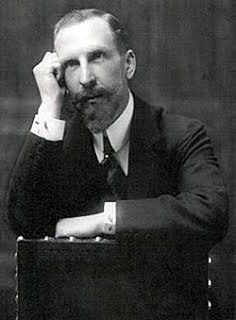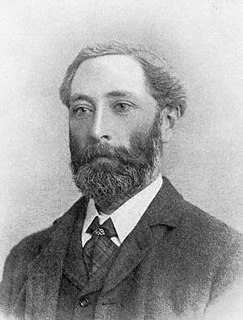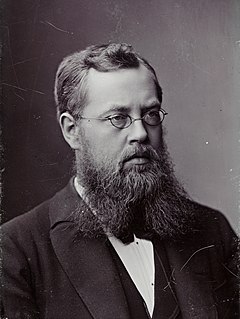Top 35 Kepler Quotes & Sayings
Explore popular Kepler quotes.
Last updated on April 14, 2025.
All Science is necessarily prophetic, so truly so, that the power of prophecy is the test, the infallible criterion, by which any presumed Science is ascertained to be actually & verily science. The Ptolemaic Astronomy was barely able to prognosticate a lunar eclipse; with Kepler and Newton came Science and Prophecy.
Kepler's discovery would not have been possible without the doctrine of conics. Now contemporaries of Kepler-such penetrating minds as Descartes and Pascal-were abandoning the study of geometry ... because they said it was so UTTERLY USELESS. There was the future of the human race almost trembling in the balance; for had not the geometry of conic sections already been worked out in large measure, and had their opinion that only sciences apparently useful ought to be pursued, the nineteenth century would have had none of those characters which distinguish it from the ancien régime.
Oh, my dear Kepler, how I wish that we could have one hearty laugh together. Here, at Padua, is the principal professor of philosophy, whom I have repeatedly and urgently requested to look at the moon and planets through my glass, [telescope] which he pertinaciously refuses to do. Why are you not here? what shouts of laughter we should have at this glorious folly! and to hear the professor of philosophy at Pisa laboring before the grand duke with logical arguments, as if with magical incantations, to charm the new planets out of the sky.
Even Johannes Kepler, Isaac Newton, Charles Darwin, Gregor Mendel, and Albert Einstein made serious mistakes. But the scientific enterprise arranges things so that teamwork prevails: What one of us, even the most brilliant among us, misses, another of us, even someone much less celebrated and capable, may detect and rectify.
[P]olitical and social and scientific values ... should be correlated in some relation of movement that could be expressed in mathematics, nor did one care in the least that all the world said it could not be done, or that one knew not enough mathematics even to figure a formula beyond the schoolboy s=(1/2)gt2. If Kepler and Newton could take liberties with the sun and moon, an obscure person ... could take liberties with Congress, and venture to multiply its attraction into the square of its time. He had only to find a value, even infinitesimal, for its attraction.
After a duration of a thousand years, the power of astrology broke down when, with Copernicus, Kepler, and Galileo, the progress of astronomy overthrew the false hypothesis upon which its entire structure rested, namely, the geocentric system of the universe. ... the earth revolves in space intervened to upset the complicated play of planetary influences, and the silent stars, relegated to the unfathomable depths of the sky, no longer made their prophetic voices audible to mankind.
Foreshadowings of the principles and even of the language of [the infinitesimal] calculus can be found in the writings of Napier, Kepler, Cavalieri, Pascal, Fermat, Wallis, and Barrow. It was Newton's good luck to come at a time when everything was ripe for the discovery, and his ability enabled him to construct almost at once a complete calculus.
A taxonomy of abilities, like a taxonomy anywhere else in science, is apt to strike a certain type of impatient student as a gratuitous orgy of pedantry. Doubtless, compulsions to intellectual tidiness express themselves prematurely at times, and excessively at others, but a good descriptive taxonomy, as Darwin found in developing his theory, and as Newton found in the work of Kepler, is the mother of laws and theories.
Mr. Dalton's permanent reputation will rest upon his having discovered a simple principle, universally applicable to the facts of chemistry - in fixing the proportions in which bodies combine, and thus laying the foundation for future labors... his merits in this respect resemble those of Kepler in astronomy.
I do not think that G. H. Hardy was talking nonsense when he insisted that the mathematician was discovering rather than creating, nor was it wholly nonsense for Kepler to exult that he was thinking God's thoughts after him. The world for me is a necessary system, and in the degree to which the thinker can surrender his thought to that system and follow it, he is in a sense participating in that which is timeless or eternal.
I wish, my dear Kepler, that we could have a good laugh together at the extraordinary stupidity of the mob. What do you think of the foremost philosophers of this University? In spite of my oft-repeated efforts and invitations, they have refused, with the obstinacy of a glutted adder, to look at the planets or the Moon or my glass [telescope].
Lest we forget, the birth of modern physics and cosmology was achieved by Galileo, Kepler and Newton breaking free not from the close confining prison of faith (all three were believing Christians, of one sort or another) but from the enormous burden of the millennial authority of Aristotelian science. The scientific revolution of the sixteenth and seventeenth centuries was not a revival of Hellenistic science but its final defeat.
[Kepler] had to realize clearly that logical-mathematical theoretizing, no matter how lucid, could not guarantee truth by itself; that the most beautiful logical theory means nothing in natural science without comparison with the exactest experience. Without this philosophic attitude, his work would not have been possible.
We have to start at ground zero and ask what it means to have a real connection with God and what it means to pray. We have to recast our whole understanding of God. We live on the other side of Copernicus, Kepler, Galileo, Isaac Newton, Charles Darwin, Sigmund Freud, Albert Einstein, Steven Hawking, a whole group of people who have recast the way we think about reality.
When the great Kepler bad at length discovered the harmonic laws that regulate the motions of the heavenly bodies, he exclaimed: "Whether my discoveries will be read by posterity or by my contemporaries is a matter that concerns them more than me. I may well be contented to wait one century for a reader, when God Himself, during so many thousand years, has waited for an observer like myself.






















